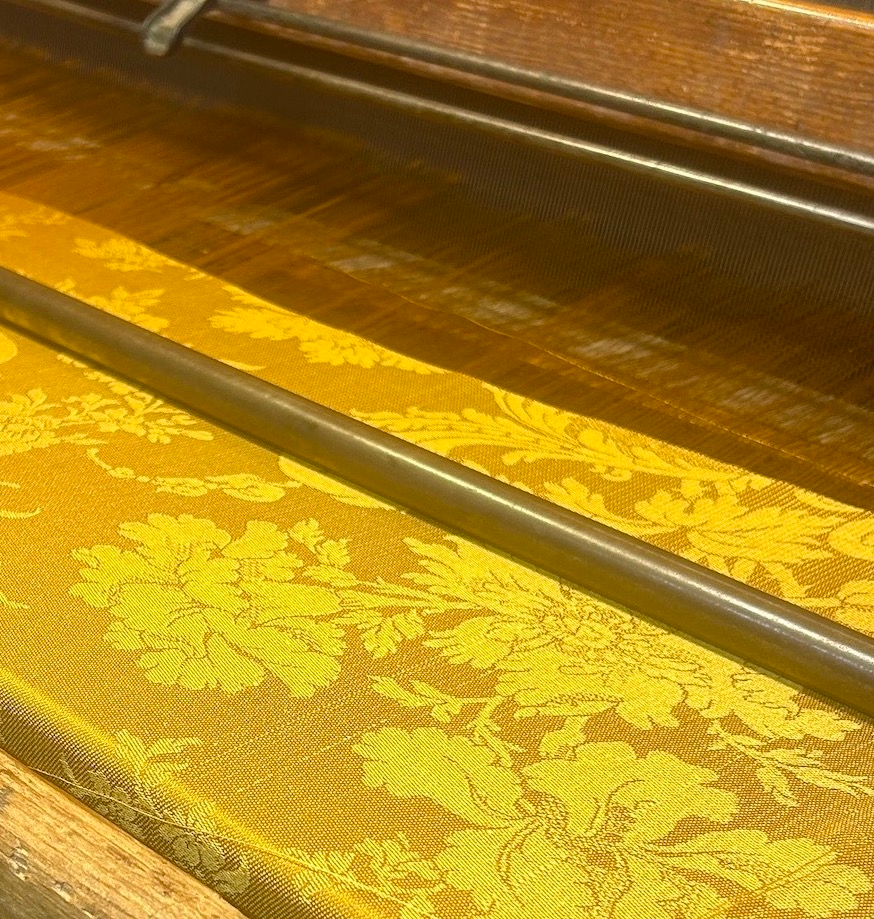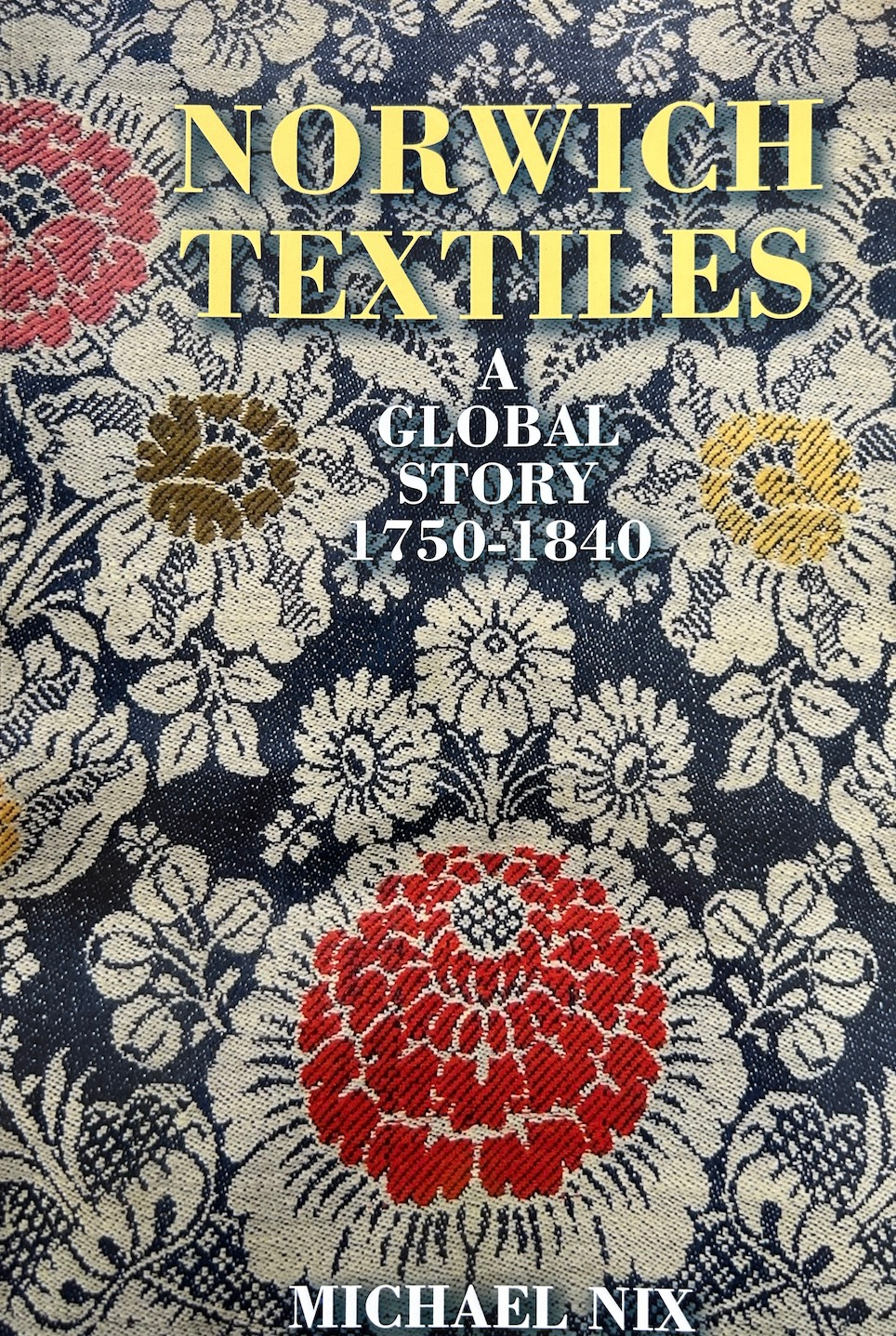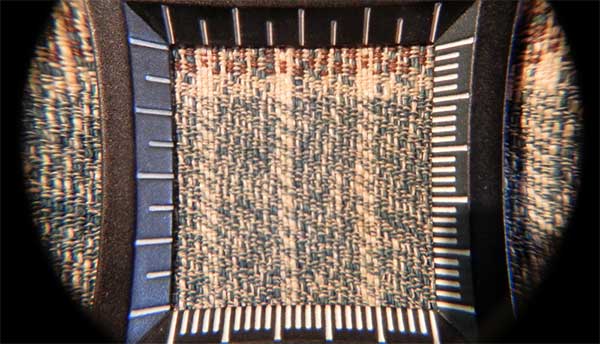
To register, click here.

To register, click here.

I rarely get the opportunity to write a newsy letter from Thistle Hill Weavers, but 2025 has found me at the computer in the office ready to get started on the New Year.
I also hardly ever get to introduce the crew here at Thistle Hill Weavers: Raina Roe, Dan Myrick, Holly Oakley, Crystal Wack, Lisbeth Ruggeri, and Betty Muscarella. The crew here is really the heart and soul of Thistle Hill Weavers and although often less visible than I am, they are the weavers and finishers who get the job done.
We have some interesting projects ahead of us this year in addition to the upholstery fabrics for our long time clients we are working on two projects for Hyde Hall – George Clarke’s bed hangings and Anne’s bed hangings and carpet.
We are finishing up the silk damask for the Fulford House in Canada and some private client damasks for window treatments.
I will be teaching a few workshops this year here at the mill, and at Kilts Farm in Stone Arabia, New York, and Historic Eastfield Village in Nassau, New York.
But the BIG NEWS for those of you interested in textile history is this year’s Textile History Forum to be held August 1, 2 and 3 in Marshfield VT at Kate Smith’s Weavers Croft.
We have invited Michael Nix from England to be our keynote speaker this year. Michael’s book on Norwich Textiles: A Global Study 1750 to 1840. is helpful to understanding the production of worsted cloths that were so much a part of the 18th and 19th century.

Design and Drafting Patterns for Handweavers
February 15th and 16th
9:30-4:00
This is class for hand weavers who want to understand weave structure and pattern formulas.
This is not a weaving workshop, instead, we will be drafting patterns and weave structures on graph paper and computers. Understanding of how the intersection of threads work to form useful structures allows us to create our own patterns and textiles that serve both as beautiful fabrics but also meet our needs for drape and durability. The goal of this class is for students to be able to design their own patterns using weave formulas rather than printed drafts..
A bibliography will be sent ahead of the class. Lunch is included. Class is limited to six students. $125
Historic Textile Workshop: Reading Historic Weaver’s Drafts and Examining Historic Textiles
March 22nd and 23rd
This is a hands on work shop, a combination of reading and interpreting the weaving recipes left by fancy weavers and vernacular weavers and examining historic coverlets woven using these drafts.
There are so many different short hand methods of recording threading and treadling patterns. We will look at styles that became the backbone of American hand weaving in the colonial revival and styles that are unusual.
Lunch is included. Class is limited to 10 students. $125
Spin, Span, Spun at Historic Eastfield Village
June 14th and 15th
Spinning Straw into Gold or Spinning on traditional spinning wheels.
Do you own a traditional spinning wheel?
This workshop is geared to folks who are already familiar with spinning but want to improve their knowledge of traditional spinning techniques and the care of traditional wheels.
Saturday we will work on treadle and flyer wheels (low wheels, flax wheels). We will get your spinning wheel running if it needs some work and we will break, and heckle flax and dress distaffs for spinning linen.
Sunday we will work with walking wheels (great wheels, wool wheels) and spin wool and cotton.
We will look at different accelerating heads that were available in the 19th century.
Previous spinning knowledge is preferred as we will not have enough time to be able to teach beginning spinning. However, if you have a wheel but don’t know how it works and want to get your wheel in good condition please join us.
This workshop will be held at Historic Eastfield Village, Nassau NY
Bring Your Spinning Wheels – Opening Day at Kilts Farm, Stone Arabia, NY
MAY 18th
Calling all spinners, traditional and modern…come spin for the day at Kilts Farm.
Join me and enjoy showing the public the variety of our wheels in motion.

For more information on our Open House or on the Textile History Forum, please call or email us at:
email: rabbitgoodythw@gmail.com
phone: 518.284.2729

email: rabbitgoodythw@gmail.com
phone: 518.284.2729
Call For Papers: Textile History Forum 2023
Friday, July 21 – Sunday, July 23, 2023
Lone Rock Farm
Marshfield, Vermont
The Textile History Forum is an academic meeting for textile enthusiasts, researchers, and textile producers that seeks give a voice to current research outside of strictly academic confines. The Textile History Forum brings together textile historians, students, researchers, museum curators, independent scholars, artisans, dealers and collectors Research papers are published in the Proceedings available the day of the Forum. Authors retain copyright on all printed publications and are free to publish their work in other venues.
The Textile History Forum seeks papers and presentations on all aspects of textile history from the Pre-Columbian period through the twenty-first century, including textile
technology, costume, quilts, weaving, dyeing, spinning, technological innovations and textile availability. The Forum is looking to include additional aspects of material culture i.e. how textiles fit into their cultural and social places, how textiles are valued, ceremonial use of textiles and the individuals who made and used them.
The Textile History Forum encourages the submission of scholarly work from historians, anthropologists and economists as well as independent researchers, individuals working the field, crafts people and collectors. Current and unpublished research is especially encouraged. Those interested in presenting a paper at the Forum should submit a one-page proposal. In addition to formal paper presentations, those interested in presenting a “work-in-progress” are also encouraged to submit a few paragraphs about their work. The Works-in-progress sessions are short presentations and no written paper is required.
Please encourage others to share their research with us. Thank you!
We’ve started a YouTube channel for our collection of historic fabrics. You can subscribe from the YouTube page.

The 2020 Textile History Forum, scheduled for July 31 – August 2 at Hyde Hall, Springfield NY, & Thistle Hill Weavers, Cherry Valley NY, seeks papers and presentations on all aspects of textile history, from the Pre-Columbian period through the twenty-first century, including textile technology, costume, quilts, weaving, dyeing, spinning, technological innovations and textile availability.
For this year’s Forum, we are looking to include additional aspects of material culture i.e. how textiles fit into their cultural and social places, how textiles are valued, ceremonial use of textiles and the individuals who made and used them.
An important aspect of this year’s Forum will be a discussion of where and how private textile collections should be housed over the next several decades.
The Textile History Forum encourages the submission of scholarly work from historians, anthropologists and economists as well as independent researchers, individuals working in the field, crafts people and collectors. Current and unpublished research is especially encouraged.
Those interested in presenting a paper at the Forum should submit a one-page proposal. Authors retain copyright on all printed publications and are free to publish their work in other venues.
The Textile History Forum brings together textile historians, students, researchers, museum curators, independent scholars, artisans, dealers and collectors from around the country for three days of intense exchange. Participants will have the opportunity to take a behind the scenes tour of the Hyde Hall textile collection. This collection is unparalleled in its surviving early damasks, trims, tassels and ornamental drapery hardware.
Forum participants will also have the opportunity to examine the hand textile tools located in the storage facility of the Farmer’s Museum in Cooperstown, NY.
Please encourage others to share their research with us.

This year’s Forum was a hands-on, up close and personal look at textile technology in transition. The group followed the changes in hand and powered technology as it brought factory spinning and weaving in competition with hand process.
We took a closer look at the ingrain carpet patent head and the hand jacquard head to begin the conversation about carpet and coverlet weavers of the 19th century. And from this we have forged ahead with plans for 2020.
When I began the Textile History Forum in 1998, I did it with the hope that we could present both academic papers and spend time in historic collections to examine textiles and textile tools. 2020 will give us that opportunity and more.
Hyde Hall, a Regency great house located inside Glimmerglass State Park, Springfield NY, will be our home base.
The vast collection of coverlets and textile tools including spinning wheels, looms, reeds, and small tools at the storage facility of the Farmers’ Museum in Cooperstown will be our laboratory.
Pre-Forum visits may include Thistle Hill Weavers production mill, a workshop on dating and identifying textiles and a visit to the New York State Museum storage facility in Rotterdam, NY.
Panel discussions are being planned for the Forum: what should we do with our private collections? Primary research methods for non-academics, and cataloguing personal collections will be among the sessions.
We are now seeking papers for publication in the 2020 Proceedings on all topics of research relating to textiles, dyes, tools, and process.
Mark your calendars, get your thinking caps on, submit your proposals and join us for a Textile History Forum 2020, to be held on July 31 – August 2, 2020. Contact us for more information and registration.